Glove Box Market Research, 2034
The global glove box market was valued at $1.8 billion in 2024, and is projected to reach $3.1 billion by 2034, growing at a CAGR of 5.1% from 2025 to 2034.
A glovebox is a specialized piece of equipment used in chemical laboratories and industrial facilities to handle materials sensitive to humidity, oxidation, or airborne contamination. It enables work in a controlled, inert atmosphere by eliminating reactive gases such as oxygen and nitrogen, ensuring the safe handling of sensitive substances.
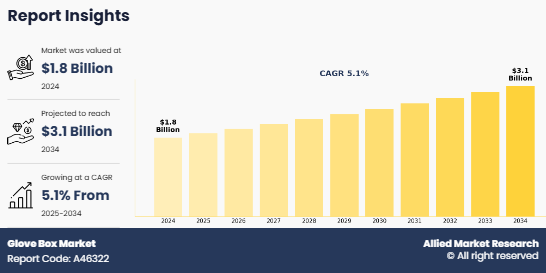
A glovebox offers several advantages, making it essential for laboratories and industrial applications. It provides a controlled environment, preventing exposure to moisture, oxygen, or airborne contaminants, ensuring the safe handling of sensitive materials. This is crucial for research in pharmaceuticals, semiconductor manufacturing, and nuclear industries. Additionally, it enhances user safety by isolating hazardous substances, reducing the risk of chemical exposure or contamination. The glovebox also supports precision work, maintaining stable conditions for experiments and production processes. Its ability to create an inert atmosphere extends the shelf life of reactive materials and improves product quality. Furthermore, modern glovebox integrate advanced filtration and monitoring systems, optimizing operational efficiency while minimizing environmental impact and workplace hazards.
Glovebox are critical components in the pharmaceutical, biotechnology, and other high-precision industries, ensuring contamination-free environments for processes that demand absolute sterility. These controlled enclosures are used for various applications, including drug formulation, vaccine production, and biological research, where maintaining a sterile environment is essential to prevent exposure to airborne contaminants. As the pharmaceutical and biotechnological industries continue to innovate and expand, particularly with advancements in gene therapy, regenerative medicine, and personalized healthcare, the demand for high-performance glovebox is witnessing a significant rise.
Glovebox are particularly indispensable in environments where contamination can directly impact the quality and safety of products. In the pharmaceutical sector, for instance, drugs and vaccines are often formulated or manufactured in these sealed environments to ensure they are not exposed to any harmful pathogens or pollutants. In biotechnology, the controlled environment provided by glovebox enables researchers to work with highly sensitive biological materials without compromising sterility. Moreover, as the pharmaceutical industry faces increasing pressure to meet stringent regulatory requirements and safety standards, the adoption of glovebox has become a standard practice in laboratories and production facilities globally.
The impact of the COVID-19 pandemic further accelerated the need for glovebox in laboratories and production environments, as companies prioritized the safe handling of biohazardous materials, particularly during vaccine development and testing. The heightened awareness of the need for contamination-free environments in the wake of the pandemic has continued to drive demand, as the focus on safety, sterility, and compliance with regulations remains at the forefront of industry priorities. As biopharmaceutical research continues to grow, especially in areas like gene therapy and personalized healthcare, the need for advanced, high-performance glovebox is expected to continue to increase.
However, despite their significant benefits, the high cost of acquiring and maintaining high-quality glovebox presents a challenge to broader market adoption. Advanced glovebox, particularly those integrated with filtration, gas purification, and automation systems, require substantial capital investment. These advanced systems offer enhanced performance, ensuring an inert atmosphere for sensitive materials, but come with a high price tag, making them less accessible to small and mid-sized enterprises. Moreover, the operational costs associated with glovebox are considerable. Maintenance, regular gas supply, and component replacements all contribute to ongoing expenses. As a result, smaller organizations, especially academic research institutions and smaller manufacturing units, may opt for alternative containment solutions, such as fume hoods or cleanrooms, which are often more affordable but may not provide the same level of controlled environments as glovebox.
While the cost barrier exists, larger pharmaceutical companies, semiconductor firms, and high-budget research institutions can afford the high initial and operational costs associated with glovebox. This has led to greater adoption in the pharmaceutical and semiconductor industries, where maintaining strict control over the environment is critical. However, for cost-sensitive sectors, the high upfront costs may continue to limit broader market penetration, particularly in emerging markets where budgets are more constrained.
Furthermore, an emerging opportunity for the glovebox market lies in the rapid growth of the renewable energy sector, specifically in lithium-ion battery production. Lithium and sodium, crucial materials in battery production, are highly reactive and require controlled, inert atmospheres to prevent degradation during manufacturing processes. Glovebox play an essential role in maintaining these conditions, enabling safe handling of these reactive materials. With the increasing demand for advanced battery technologies, including solid-state batteries and hydrogen fuel cells, glovebox are becoming an integral tool in energy research and development. Government initiatives promoting clean energy and electric vehicle (EV) adoption are further fueling the need for high-performance batteries, driving investments in glovebox systems for material handling in this industry.
Glove Box Market Outlook is segmented on the basis of equipment, port configuration, end user, and region.
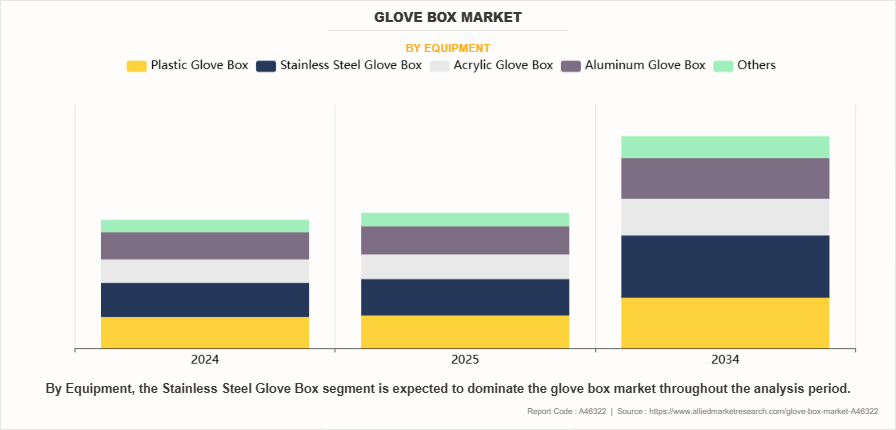
On the basis of equipment, the Glove Box Market Size is divided into Plastic Glove Box, Stainless Steel Glove Box, Acrylic Glove Box, Aluminum Glove Box, and others.
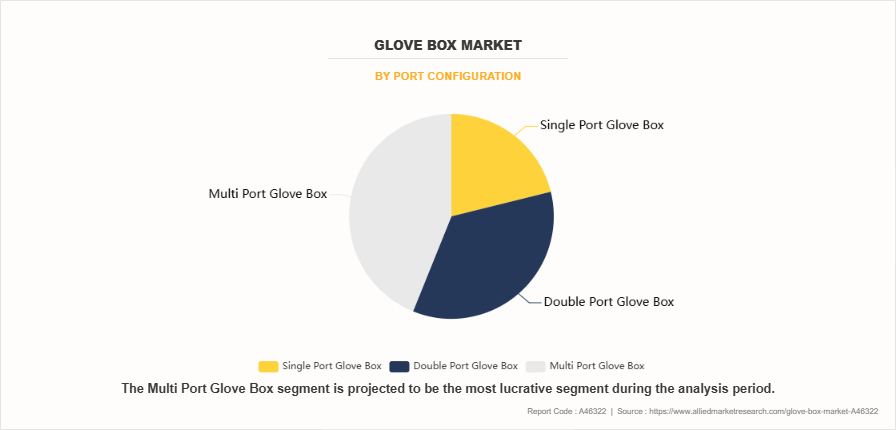
Based on port configuration, the Glove Box Market Share is segmented into Single Port Glove Box, Double Port Glove Box, and Multi Port Glove Box.
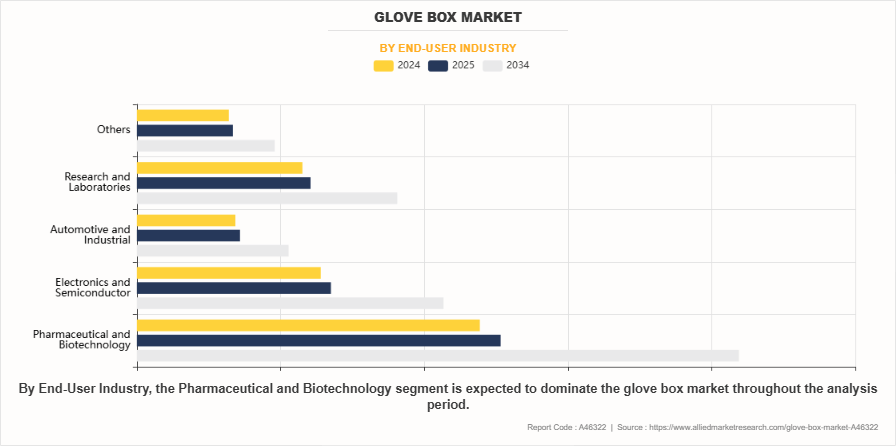
On the basis of end user industry, the Glove Box Market Growth is classified as Pharmaceutical & Biotechnology, Electronics & Semiconductor, Automotive & Industrial, Research & Laboratories, and others.
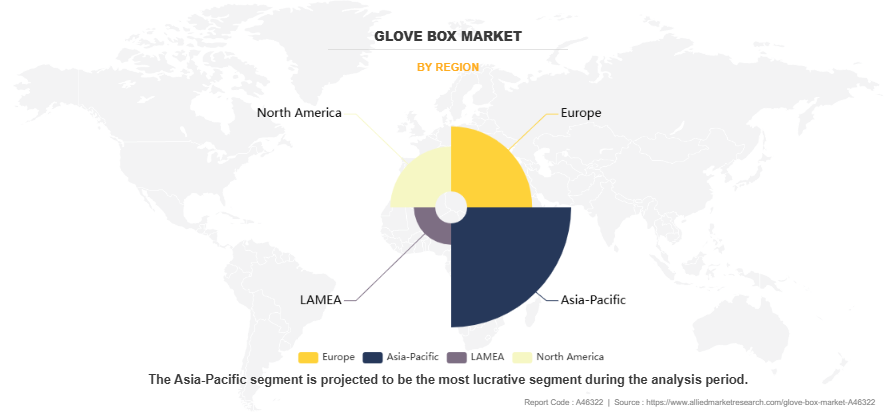
On the basis of region, Glove Box Market Forecast is analyzed across North America (the U.S., Canada, and Mexico), Europe (the UK, Germany, France, Italy, and the rest of Europe), Asia-Pacific (China, Japan, India, South Korea, and rest of Asia-Pacific), LAMEA (Latin America, Middle East, Africa).
Competition Analysis
The key players in the Glovebox market are Jacomex, Cleatech, LLC, AMADA WELD TECH, Etelux., Labconco, Terra Universal. Inc., Vigor Technologies (USA ) Inc, Munro Instruments Limited, Plas-Labs, Inc. , and Stericox India Private Limited. Product launch and acquisition business strategies were adopted by the major market players in 2024.
Top Impacting Factors
One of the significant factors that impact growth of the global Glove box market includes the growing demand in pharmaceutical and biotechnology sectors. Moreover, the expansion in semiconductor and lithium-ion battery production is driving the growth of glove box market. However, high initial investment and maintenance costs might hamper the growth of the market. On the contrary, the growing demand for advanced battery technologies, such as solid-state batteries and hydrogen fuel cells, creates significant opportunities for gloveboxes in controlled material.
Key Benefits For Stakeholders
- This report provides a quantitative analysis of the Glove Box market segments, current trends, estimations, and dynamics of the glove box market analysis from 2024 to 2034 to identify the prevailing Glove Box Market Opportunity.
- The market research is offered along with information related to key drivers, restraints, and opportunities.
- Porter's five forces analysis highlights the potency of buyers and suppliers to enable stakeholders make profit-oriented business decisions and strengthen their supplier-buyer network.
- In-depth analysis of the glove box market segmentation assists to determine the prevailing market opportunities.
- Major countries in each region are mapped according to their revenue contribution to the global Glove Box Industry.
- Market player positioning facilitates benchmarking and provides a clear understanding of the present position of the Glove Box Industry players.
- The report includes the analysis of the regional as well as global glove box market trends, Glove Box Industry key players, Containment Glove, Glove Box Market segments, application areas, and Glove box market growth strategies.
Glove Box Market Report Highlights
| Aspects | Details |
| Market Size By 2034 | USD 3.1 billion |
| Growth Rate | CAGR of 5.1% |
| Forecast period | 2024 - 2034 |
| Report Pages | 291 |
| By Equipment |
|
| By Port Configuration |
|
| By End-User Industry |
|
| By Region |
|
| Key Market Players | AMADA WELD TECH, Plas-Labs, Inc., Vigor Technologies (USA ) Inc, Munro Instruments Limited, Labconco Corporation, Stericox India Private Limited, Jacomex, Terra Universal. Inc, Etelux, Cleatech, LLC |
Integration of Smart Technology and Automation, and Increased Adoption in Renewable Energy and Energy Storage are the upcoming trends of Glove Box Market in the globe
Pharmaceutical industry is the leading application of Glove Box Market
Asia-Pacific is the largest regional market for Glove Box
In 2024, $1.8 billion was the estimated industry size of Glove Box
Jacomex, Cleatech, LLC, AMADA WELD TECH, Etelux., Labconco, Terra Universal. Inc., Vigor Technologies (USA ) Inc, Munro Instruments Limited, Plas-Labs, Inc. , and Stericox India Private Limited are the top companies to hold the market share in Glove Box
Loading Table Of Content...
Loading Research Methodology...


